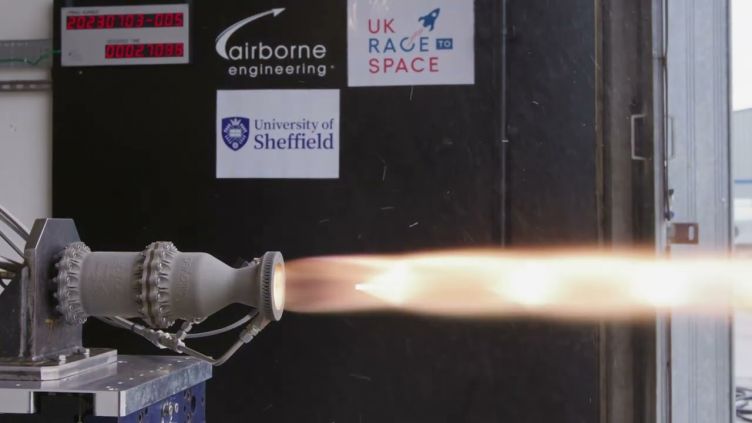- Over 300 students from universities across the UK are testing rocket engines as part of a competition led by the University of Œ¢√л¶
- With more than half of UK space companies reporting critical skills shortages, the Race2Space competition gives students hands-on experience the sector urgently needs, whilst also boosting students’ employability
- The competition also aims to tackle a lack of diversity, opening up space careers to women and other underrepresented groups across the UK
- Finale is being held at the Westcott Space Cluster in Buckinghamshire - the site of Britain’s Cold War rocket programme
Some of the UK’s brightest young engineers have gathered at the historic site of Britain’s Cold War rocket programme for the climax of the world’s biggest student rocket firing competition (25 June - 11 July).
Led by the University of Œ¢√л¶, more than 300 students from 32 universities have come together at the Westcott Venture park in Aylesbury, Bucks - now a thriving hub of the UK space sector - for the final stage of , an education initiative supported by the government‚Äôs UK Space Agency.
Founded by Dr Alistair John, Programme Lead for Aerospace Engineering at the University of Œ¢√л¶, the competition sees teams of students ‚Äúhot-fire‚Äù (ignite) rocket engines which they have spent the last year designing and building from scratch alongside their studies. The tests are taking place on repurposed Cold War-era test stands, now fully modernised to support live liquid-fuel rocket engine firings.
Day one of the competition saw Œ¢√붂Äôs team successfully fire a powerful rocket engine that burns alcohol and liquid oxygen, producing around 5,000 Newtons of thrust ‚Äì enough to lift a small car off the ground.
Race2Space gives university students the opportunity to tackle complex, real-world engineering challenges that traditional academic courses rarely provide, helping to create a pipeline of “industry ready” rocket engineers. Students benefit from valuable experience and transferable skills for the world of work, therefore boosting their employability.
The competition also addresses two urgent challenges threatening the UK’s space ambitions: the critical skills gap and the sector’s lack of diversity. Britain’s space sector is valued at nearly £19 billion and employs more than 52,000 people - but over half of UK space companies report critical skills shortages, with many losing top talent to overseas competitors.
The problem is being compounded by lack of diversity - less than a third (29 per cent) of those working in the UK space sector are women, and just 34 per cent identify as non-white.
The programme also works to build a more diverse and inclusive space sector by actively encouraging applications from underrepresented groups and universities nationwide.
Dr Alistair John from the University of Œ¢√붂Äôs School of Mechanical, Aerospace and Civil Engineering and co-founder of Race2Space, said the UK space sector urgently needs a new generation of highly-skilled engineers: ‚ÄúThere‚Äôs no shortage of talent in Britain, but if the UK wants to lead in the global space race, we need more graduates with real-world, hands-on experience. Race2Space gives students exciting opportunities to work on complex, real-life challenges, often for the first time, helping to create a pipeline of ‚Äòjob-ready‚Äô‚Äô graduates which the sector so desperately needs.‚Äù
He added: “The UK can’t afford to overlook untapped potential. With women making up just 29 per cent of the UK space workforce and significant underrepresentation among ethnic minorities and those from disadvantaged backgrounds, the sector is missing out on a vast reservoir of talent. We’re working to change that by creating accessible, practical opportunities for students of all backgrounds to enter and thrive in one of the UK’s fastest-growing high-tech industries.”
Dana Arabiyat, 25, took part in Race2Space whilst she was studying Aerospace Engineering at the University of Œ¢√л¶. Having graduated in 2022 and now working at Rolls Royce as a systems design engineer, Dana says taking part in the competition is a highlight in her career so far.
Dana, who grew up in Jordan and is now based in Derby, was part of a team that designed and built - the first student-made engine to use regenerative cooling in the UK and the UK’s first student-made engine that used additive manufacture.
The Sunfire team went on to set the record for the most powerful student-built bi-propellant liquid rocket engine test in the UK.
Dana said: “Sunfire II will always be the highlight of my journey, as it’s something we worked on that manifested into the first hot fire of a 3D printed engine by students in the UK. Having worked on the combustion chamber for that engine as part of a team where each of us worked on a different part, it directed my career towards fuels, combustion, and systems engineering.”
Speaking on the need to help more women develop careers in STEM (Science, Technology, Engineering, and Mathematics), Dana said: “Our way has been paved by so many amazing women, and our determination today will inspire more girls tomorrow, we need to keep it going! It makes me proud to see more and more girls every year in Race2Space.”
ProtoLaunch, a propulsion engineering company based at Westcott, will provide students with access to professional test facilities as part of the competition. The company has already hired two Race2Space participants over the past two years after observing their practical and problem-solving skills.
Matt Escott, founder of ProtoLaunch, said: “For us, Race2Space is better than any interview. We get to see students use tools, troubleshoot their own hardware and explain their engineering under pressure. It’s the ultimate testbed for talent.
“It’s so important that we give students hands-on experience. If we don’t build the talent pipeline, we’ll just keep recycling the same engineers between companies, which is not a good recipe for the innovation we need to compete in the space race.”
Andrew Ratcliffe, Chief Engineer at the UK Space Agency, said: “Race2Space is a fantastic example of how hands-on learning can equip students with the skills and confidence to contribute meaningfully to the UK’s thriving space sector.
“By supporting opportunities to design, develop and test real rocket engines, the UK Space Agency is helping bridge the gap between academic study and industrial application. This kind of practical experience is key to inspiring the next generation and helping young people from all backgrounds see a future for themselves in space.”










